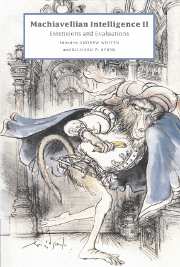Book contents
- Frontmatter
- Contents
- Contributors
- Preface
- 1 Machiavellian intelligence
- 2 Friendships, alliances, reciprocity and repair
- 3 Why Machiavellian intelligence may not be Machiavellian
- 4 Social intelligence and success: Don't be too clever in order to be smart
- 5 Minding the behaviour of deception
- 6 The Machiavellian mindreader
- 7 Exploiting the expertise of others
- 8 Primates' knowledge of their natural habitat: As indicated in foraging
- 9 Evolution of the social brain
- 10 The modulatory of social intelligence
- 11 The Technical Intelligence hypothesis: An additional evolutionary stimulus to intelligence?
- 12 Protean primates: The evolution of adaptive unpredictability in competition and courtship
- 13 Egalitarian behaviour and the evolution of political intelligence
- 14 Social intelligence and language: Another Rubicon
- Index
12 - Protean primates: The evolution of adaptive unpredictability in competition and courtship
Published online by Cambridge University Press: 23 November 2009
- Frontmatter
- Contents
- Contributors
- Preface
- 1 Machiavellian intelligence
- 2 Friendships, alliances, reciprocity and repair
- 3 Why Machiavellian intelligence may not be Machiavellian
- 4 Social intelligence and success: Don't be too clever in order to be smart
- 5 Minding the behaviour of deception
- 6 The Machiavellian mindreader
- 7 Exploiting the expertise of others
- 8 Primates' knowledge of their natural habitat: As indicated in foraging
- 9 Evolution of the social brain
- 10 The modulatory of social intelligence
- 11 The Technical Intelligence hypothesis: An additional evolutionary stimulus to intelligence?
- 12 Protean primates: The evolution of adaptive unpredictability in competition and courtship
- 13 Egalitarian behaviour and the evolution of political intelligence
- 14 Social intelligence and language: Another Rubicon
- Index
Summary
Introduction: Unpredictability, animacy and psychology
Nature cloaks herself in many modes of unpredictability. Science advances in part by recognising and distinguishing these modes (see Kruger et al., 1987). Statistical mechanics modelled the complexity of fluids using stochastic principles. Quantum theory accepted the noisiness of elementary particles. Chaos theory revealed that many dynamical systems show extreme sensitivity to initial conditions. Evolutionary theory showed how random variation plus cumulative selection could yield organic complexity. Such progress in physics and biology has not been matched by psychology. Although unpredictability is a hallmark of animal behaviour, it has been the bane of the behavioural sciences. Variation in behaviour, whether across species, situation, space, or time, has usually been attributed either to adaptation or to error, with adaptation narrowly defined as systematic (if complex) correspondence between environmental conditions and behavioural tactics, and error narrowly defined as raw behavioural noise. Psychology's favourite statistical shibboleth, analysis of variance, assumes that behaviour can be explained by the interaction of environmental determinants and random, non-adaptive noise.
This chapter examines a type of behaviour that is both adaptive and noisy, both functional and unpredictable, and that has therefore been overlooked by most behavioural scientists. The difficulty of predicting animal behaviour may be much more than a side-effect of the complexity of animal brains. Rather, the unpredictability may result from those brains having been selected over evolutionary history to baffle and surprise all of the would-be psychologists who preceded us. To appreciate why psychology is hard, we have to stop thinking of brains as physical systems full of quantum noise and chaos, or as computational systems full of informational noise and software bugs.
- Type
- Chapter
- Information
- Machiavellian Intelligence IIExtensions and Evaluations, pp. 312 - 340Publisher: Cambridge University PressPrint publication year: 1997
- 66
- Cited by



